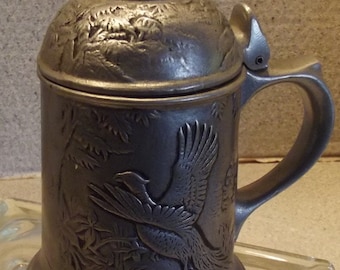
The Pewter Mug: Is it Gluten Free?
For those navigating the complexities of a gluten-free lifestyle, every detail matters, even the seemingly innocuous vessel from which they drink. The question, “Is a pewter mug gluten free?” might seem unusual, but it reflects a genuine concern for cross-contamination and potential sources of hidden gluten. This article delves into the composition of pewter, the manufacturing process of pewter mugs, and whether individuals with celiac disease or gluten sensitivity need to be concerned.
Understanding Pewter Composition
Pewter, historically, was an alloy of tin, antimony, copper, and sometimes lead. Modern pewter, however, adheres to stricter safety standards and typically consists of approximately 90-95% tin, with the remainder being antimony and copper. Lead is generally avoided in modern food-safe pewter due to its toxicity. The specific composition can vary by manufacturer, but the core components remain consistent. Because of this specific composition, a pure pewter mug is unlikely to contain gluten.
It’s important to note that the term “alloy” simply refers to a mixture of metals. Gluten, a protein found in wheat, barley, and rye, is not a metal and would not naturally occur in the metallic composition of pewter. Therefore, the inherent composition of pewter mugs suggests they should be inherently gluten-free.
Manufacturing Processes and Gluten Contamination
While the raw materials of pewter are gluten-free, the manufacturing process is where potential contamination could occur. Here’s a breakdown of typical manufacturing steps:
- Melting and Alloying: The metals are heated and combined to form the pewter alloy.
- Casting or Spinning: The molten pewter is either poured into molds (casting) or shaped using a spinning lathe.
- Finishing: The pewter mug is polished, potentially engraved, and may receive a protective coating.
The risk of gluten contamination during these steps is generally low, but not impossible. If the manufacturing facility also processes food products containing gluten, there is a theoretical risk of cross-contamination. This is more likely to be a concern in smaller workshops that may not have stringent cleaning protocols. Large-scale manufacturers dedicated to metalworking are less likely to have this issue. Therefore, the question ‘is this pewter mug gluten free‘ is largely based on where it was manufactured and how strict their cleaning protocols are.
Potential Sources of Gluten Contamination
Even if the manufacturing process is generally clean, specific scenarios could introduce gluten:
- Polishing Compounds: Some polishing compounds may contain gluten-based binders or abrasives.
- Shared Equipment: If polishing wheels or other equipment are used for both food-grade and non-food-grade items (including those containing gluten), cross-contamination is possible.
- Workplace Environment: Airborne gluten particles from nearby food processing areas could settle on the pewter mugs.
Minimizing Risk for Gluten-Sensitive Individuals
For individuals with celiac disease or severe gluten sensitivity, taking precautions is always advisable. Here are some steps to minimize the risk of gluten exposure from a pewter mug:
- Inquire with the Manufacturer: Contact the manufacturer directly and inquire about their gluten-free protocols. Ask if they test for gluten or if their facility handles gluten-containing products.
- Choose Reputable Brands: Opt for pewter mugs from well-known and reputable brands that adhere to strict quality control standards.
- Thorough Cleaning: Wash the pewter mug thoroughly with hot, soapy water before first use. Use a dedicated sponge or brush that is not used for washing gluten-containing items.
- Avoid Abrasive Cleaners: Abrasive cleaners could scratch the pewter surface, creating crevices where gluten particles could accumulate.
- Consider a Protective Coating: Applying a food-safe sealant or coating to the interior of the mug can provide an extra barrier against potential contamination.
Pewter and Other Allergens
While the primary concern is gluten, it’s worth considering other potential allergens. Pewter itself, being a metal alloy, is not a common allergen. However, individuals with metal sensitivities (e.g., to nickel or copper) may experience reactions. If you have known metal allergies, carefully review the composition of the pewter alloy and consult with a healthcare professional if needed.
The Verdict: Is Your Pewter Mug Gluten Free?
In most cases, a pewter mug is likely to be gluten-free due to its inherent composition. However, the risk of cross-contamination during manufacturing cannot be entirely eliminated. By taking the precautions outlined above – inquiring with the manufacturer, choosing reputable brands, and thoroughly cleaning the mug – individuals with gluten sensitivities can significantly reduce their risk of exposure. The answer to ‘is my pewter mug gluten free‘ is therefore likely yes, but due diligence is still required.
Ultimately, the level of caution depends on the individual’s sensitivity to gluten. Those with severe celiac disease may prefer to err on the side of caution and opt for alternative drinkware materials known to be gluten-free, such as glass, stainless steel, or ceramic. For others with mild gluten intolerance, a well-cleaned pewter mug from a reputable source should pose minimal risk. It’s all about knowing your body and taking the necessary steps to protect your health. The beautiful aesthetic of the pewter mug can still be enjoyed, with a little extra care and attention to detail.
Remember to always double-check ingredients and manufacturing practices when dealing with potential allergens. A little research and awareness can go a long way in maintaining a safe and enjoyable gluten-free lifestyle. The question ‘is a pewter mug gluten free‘ is not a simple yes or no, but a question that requires understanding and consideration.
[See also: Gluten-Free Drink Recipes]
[See also: Safe Cookware for Celiac Disease]
[See also: Understanding Gluten Cross-Contamination]
